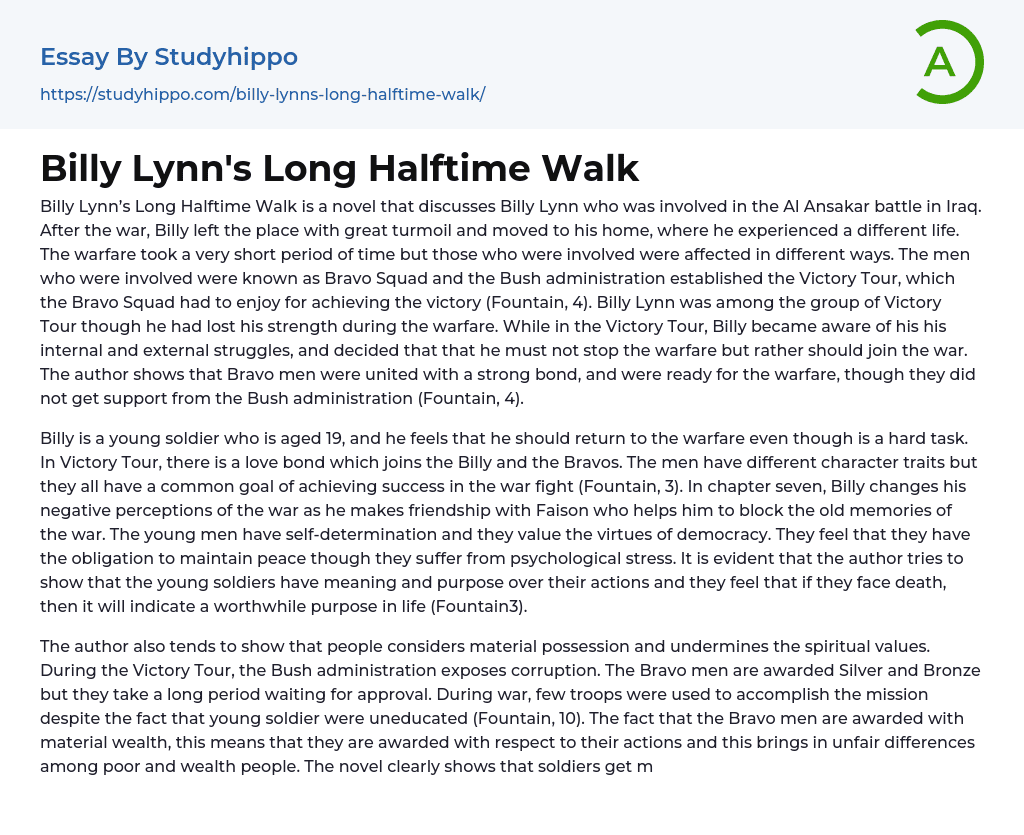Billy Lynn’s Long Halftime Walk is a novel that discusses Billy Lynn who was involved in the Al Ansakar battle in Iraq. After the war, Billy left the place with great turmoil and moved to his home, where he experienced a different life. The warfare took a very short period of time but those who were involved were affected in different ways. The men who were involved were known as Bravo Squad and the Bush administration established the Victory Tour, which the Bravo Squad had to enjoy for achieving the victory (Fountain, 4). Billy Lynn was among the group of Victory Tour though he had lost his strength during the warfare. While in the Victory Tour, Billy became aware of his his internal and external struggles, and decided that that he must not stop the warfare
...but rather should join the war. The author shows that Bravo men were united with a strong bond, and were ready for the warfare, though they did not get support from the Bush administration (Fountain, 4).
Billy is a young soldier who is aged 19, and he feels that he should return to the warfare even though is a hard task. In Victory Tour, there is a love bond which joins the Billy and the Bravos. The men have different character traits but they all have a common goal of achieving success in the war fight (Fountain, 3). In chapter seven, Billy changes his negative perceptions of the war as he makes friendship with Faison who helps him to block the old memories of the war. The young men have self-determination and they value the virtues of democracy. They fee
that they have the obligation to maintain peace though they suffer from psychological stress. It is evident that the author tries to show that the young soldiers have meaning and purpose over their actions and they feel that if they face death, then it will indicate a worthwhile purpose in life (Fountain3).
The author also tends to show that people considers material possession and undermines the spiritual values. During the Victory Tour, the Bush administration exposes corruption. The Bravo men are awarded Silver and Bronze but they take a long period waiting for approval. During war, few troops were used to accomplish the mission despite the fact that young soldier were uneducated (Fountain, 10). The fact that the Bravo men are awarded with material wealth, this means that they are awarded with respect to their actions and this brings in unfair differences among poor and wealth people. The novel clearly shows that soldiers get material possession to strengthen their effort in order to achieve successes (Fountain, 10).
Ben Foutain introduces the idea of exploitation in the novel as it is clear that the boys are exploited so that the administration can benefit from their actions. Billy experiences sexual tension and it is only his sister who develops concern. She tells him that he could not return to war and also goes ahead and plans his getting back home. (Fountain, 11). In this war, the young soldiers fail to achieve their expectations, that is winning the war, and this is out of preoccupation with other things as opposed to the war itself. This shows that the America society overlooks the military power and put more focus in material
things that seemingly are believed to be the major determinants of their success.
Generally, the author shows that even though the young soldiers lacked adequate education and tool in the warfare, which are very important things in such kind of a setting, they were ready for the fight. This expresses or rather shows their strong spirit, their willingness, as well as their determination. They had an unbreakable brotherhood and this strengthened them in the warfare. Regardless of this, the author’s points out that Bush administration was interested with materialism and exploitation. They distributed unequal awards to the Bravo men with respect to their actions. In addition, they overlooked their roles as young military and exploited them to take advantage over them.
Work cited
- Fountain, Ben. Billy Lynn's Long Halftime Walk. New York: Ecco, 2012. Print.
- Apology essays
- Character Traits essays
- Compassion essays
- Expressive essays
- Perseverance essays
- American Dream essays
- Barriers To Entry essays
- Capitalism essays
- Central Bank essays
- Compensation essays
- Consumerism essays
- Economic Development essays
- Economic Growth essays
- Economic Inequality essays
- Economic System essays
- Economy essays
- Employment essays
- Export essays
- Finance essays
- Free Trade essays
- Gross Domestic Product essays
- Human Development essays
- Income Inequality essays
- Industry essays
- Inflation essays
- International Business essays
- International Trade essays
- Macroeconomics essays
- Materialism essays
- Max Weber essays
- Microeconomics essays
- Minimum Wage essays
- Monetary Policy essays
- Monopoly essays
- Pricing essays
- Profit essays
- Recession essays
- resources essays
- Taxation essays
- Trade essays
- Unemployment essays
- Warehouse essays
- World economy essays




